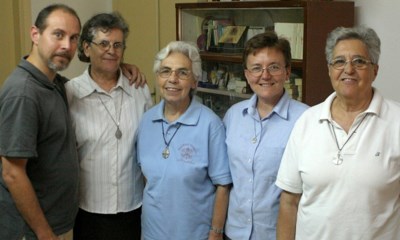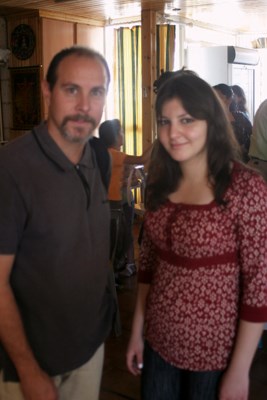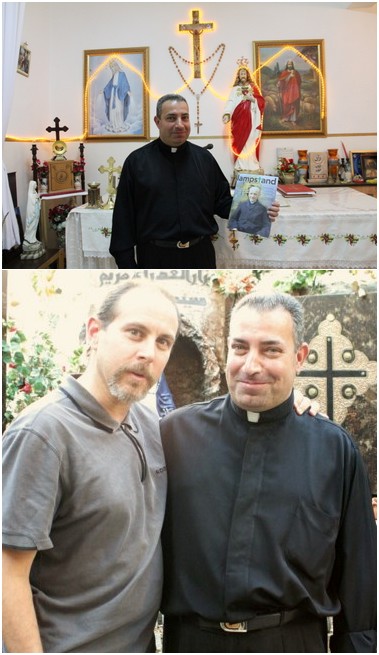It is Saturday and we arrive to a house in a middle-class neighbourhood of west Amman. There is quite a crowd gathering for the day’s events. Inside, the Franciscan Missionaries of Mary have a full-morning planned. In the back room there are dozens of children participating in an activity. They are all Iraqis displaced because of the war in their country. Jordan has welcomed these refugees, but while they are in Jordan, they have no status. There are no jobs for Jordanians and the government does not see how jobs can be offered to Iraqis, who are not expected to stay forever. The children are able to attend school, but their parents cannot work.

Sister Wardeh is from Lebanon. She lives in this small Franciscan community with Sr. Dolores, from Spain; Sr. Brygida, from Poland and Sr. Gina, from Italy. The four of them run all the programs for the 160 families that come here for services.
Today, the Sisters have planned a special activity for the children. I met Hadeel Matti, a young woman whose family came about 5 years ago. Hadeel has just finished high school and hopes to be a dentist. If she can go to University in Jordan, she will be able to qualify for work here. Still, the fees are too high. She wonders about attending a university in Europe or North America. Her sister, Falah arrived in Jordan with her husband and children six months ago. She told me that Iraq is not safe. Since the 2003 invasion of Iraq, there is no security in the country. “At least under Saddam Hussein we had

security,” she told me. And, since the war, the situation is worse for Christians who are seen as “western” by some Muslims and sometimes treated as traitors by those who feel threatened by the West. Many Christians have been killed. Falah and her family did not want to leave; they always hoped that things would change but the situation got worst. Her husband owned a liquor store in Mosul, and as a business owner, he was a target for kidnappings and extortion. He was beaten up once and accused of “not having a religion,” by people who claim that Iraq should be an Islamic state. Still, they stayed, but the children had to stop going to school and the family lived in fear. The threats continued until they received an ultimatum, “if you don’t close your store, we will kill your children.” That was the final straw. Parents will sacrifice anything for their children's safety.
The first months in Jordan were not easy. The children were not attending school, but thanks to Sr. Wardeh and the Franciscan sisters, Falah was able to find a Christian school for her two children. Falah remembers the first time they came to the Sisters’ home. They had a prayer meeting. When Falah told me about it, she had a hard time describing the meeting, but remembers it as a “spiritual release.” She told me that it was beautiful. The sisters reminded them that God was with them even despite their troubles.
A few minutes away, in a building converted to house a church-space in the basement, we met Fr. Raymond Moussalli, at the Sacred Heart Chaldean Church. It is the only Chaldean Church in the whole of Jordan, serving 5000 people. All of the parishioners are Iraqi refugees. The term Chaldean refers to the Hellenistic designation of a region of Babylon, or what today is known as Iraq. The Chaldean Catholic Church is one of the 23 Eastern Rites Churches that are in full communion with Rome and has an estimated 420,000 members world-wide. Fr. Raymond is the Chaldean Patriarch Vicar for Jordan, which means that he is the Bishop’s (Patriarch) representative (Vicar) for this region. He is the only Chaldean priest in Jordan.

Iraq can be considered part of the Holy Land, in that there are biblical locations in what is known today as Iraq. I recognised names such as Babylon, Mesopotamia, Chaldea and Assyria from the Bible. Nineveh is also in present-day Iraq. There have been Christians in Iraq for 2000 years. They trace their ancestry to the ancient Assyrians and Babylonians. Those who belong to the Chaldean-Church are known as Chaldeans, but there are also members of the Syrian Orthodox Church, known as Syriacs. The language of the Chaldean liturgy is still Aramaic, the language spoken by Jesus.
Before the 2003 invasion, there were over 1 million Christians in Iraq, a country whose mostly Muslim population is about 30 million. Since then about half of the Christians have been forced to flee to neighbouring countries, such as Jordan, or have migrated to the West. Fr. Raymond estimates that about half a million of them have been through Jordan.
Fr. Raymond reminded us that with the Iran-Iraq war in the 80’s, the Invasion of Kuwait and the Gulf War in 1990-91, things have been unstable in Iraq for a long time.
With Fr. Raymond, we met Vivian and Nabeel Kandha. Perhaps you remember the news from July 12, 2009. Six bombs exploded around Baghdad, targeting Christian communities. The most deadly of them took place outside a church and killed four people and injured 21 people. Nabeel and Vivian’s son, Marwan was killed as he walked out of the Church after Mass. Vivian and Nabeel’s situation is typical of Iraqi refugees in Jordan. While they’ve applied for refugee status with the UN, while in Jordan, they cannot work and must re-apply for refugee status every three months, until their claim is processed. They hope to join their eldest son who is studying in Sweden, but are unable to do much until they receive their papers. So they’ve been waiting for a year. Fr. Raymond works with many refugees who are in similar situations. Many of them suffer psychological problems and post-traumatic stress syndrome, and the computer and language courses offered at the Church are but one piece in a complicated pastoral approach.
At the Sister’s home, this past Summer, the Iraqi children participated in the very first summer camp ran by the Sisters. Falah and Hadeel helped out. The children loved the camp and did not want to go home at the end. Since the camp, the children meet once a week to pray, learn about scripture and about the Church. When we were there was a Saturday, but the activities were similar. The scripture reading was from Matthew 6:28:
“And why do you worry about clothes? See how the lilies of the field grow. They do not labour or spin.” The children made flower petal “crowns” that they can wear, framing their faces, so that their faces are the “flowers.” This activity reminds them that if God takes care of the flowers, He will take care of them much, much more.
It would have been easy to feel sorry for these people, but amidst the children’s laughter and the Sisters’ and Fr. Raymond’s enthusiasm, I certainly had the sense that God was present. He provides for them and protects them; Just as he takes care of all creation, he takes care of his beloved Iraqis.
 Iraq can be considered part of the Holy Land, in that there are biblical locations in what is known today as Iraq. I recognised names such as Babylon, Mesopotamia, Chaldea and Assyria from the Bible. Nineveh is also in present-day Iraq. There have been Christians in Iraq for 2000 years. They trace their ancestry to the ancient Assyrians and Babylonians. Those who belong to the Chaldean-Church are known as Chaldeans, but there are also members of the Syrian Orthodox Church, known as Syriacs. The language of the Chaldean liturgy is still Aramaic, the language spoken by Jesus.
Before the 2003 invasion, there were over 1 million Christians in Iraq, a country whose mostly Muslim population is about 30 million. Since then about half of the Christians have been forced to flee to neighbouring countries, such as Jordan, or have migrated to the West. Fr. Raymond estimates that about half a million of them have been through Jordan.
Fr. Raymond reminded us that with the Iran-Iraq war in the 80’s, the Invasion of Kuwait and the Gulf War in 1990-91, things have been unstable in Iraq for a long time.
With Fr. Raymond, we met Vivian and Nabeel Kandha. Perhaps you remember the news from July 12, 2009. Six bombs exploded around Baghdad, targeting Christian communities. The most deadly of them took place outside a church and killed four people and injured 21 people. Nabeel and Vivian’s son, Marwan was killed as he walked out of the Church after Mass. Vivian and Nabeel’s situation is typical of Iraqi refugees in Jordan. While they’ve applied for refugee status with the UN, while in Jordan, they cannot work and must re-apply for refugee status every three months, until their claim is processed. They hope to join their eldest son who is studying in Sweden, but are unable to do much until they receive their papers. So they’ve been waiting for a year. Fr. Raymond works with many refugees who are in similar situations. Many of them suffer psychological problems and post-traumatic stress syndrome, and the computer and language courses offered at the Church are but one piece in a complicated pastoral approach.
At the Sister’s home, this past Summer, the Iraqi children participated in the very first summer camp ran by the Sisters. Falah and Hadeel helped out. The children loved the camp and did not want to go home at the end. Since the camp, the children meet once a week to pray, learn about scripture and about the Church. When we were there was a Saturday, but the activities were similar. The scripture reading was from Matthew 6:28: “And why do you worry about clothes? See how the lilies of the field grow. They do not labour or spin.” The children made flower petal “crowns” that they can wear, framing their faces, so that their faces are the “flowers.” This activity reminds them that if God takes care of the flowers, He will take care of them much, much more.
It would have been easy to feel sorry for these people, but amidst the children’s laughter and the Sisters’ and Fr. Raymond’s enthusiasm, I certainly had the sense that God was present. He provides for them and protects them; Just as he takes care of all creation, he takes care of his beloved Iraqis.
Iraq can be considered part of the Holy Land, in that there are biblical locations in what is known today as Iraq. I recognised names such as Babylon, Mesopotamia, Chaldea and Assyria from the Bible. Nineveh is also in present-day Iraq. There have been Christians in Iraq for 2000 years. They trace their ancestry to the ancient Assyrians and Babylonians. Those who belong to the Chaldean-Church are known as Chaldeans, but there are also members of the Syrian Orthodox Church, known as Syriacs. The language of the Chaldean liturgy is still Aramaic, the language spoken by Jesus.
Before the 2003 invasion, there were over 1 million Christians in Iraq, a country whose mostly Muslim population is about 30 million. Since then about half of the Christians have been forced to flee to neighbouring countries, such as Jordan, or have migrated to the West. Fr. Raymond estimates that about half a million of them have been through Jordan.
Fr. Raymond reminded us that with the Iran-Iraq war in the 80’s, the Invasion of Kuwait and the Gulf War in 1990-91, things have been unstable in Iraq for a long time.
With Fr. Raymond, we met Vivian and Nabeel Kandha. Perhaps you remember the news from July 12, 2009. Six bombs exploded around Baghdad, targeting Christian communities. The most deadly of them took place outside a church and killed four people and injured 21 people. Nabeel and Vivian’s son, Marwan was killed as he walked out of the Church after Mass. Vivian and Nabeel’s situation is typical of Iraqi refugees in Jordan. While they’ve applied for refugee status with the UN, while in Jordan, they cannot work and must re-apply for refugee status every three months, until their claim is processed. They hope to join their eldest son who is studying in Sweden, but are unable to do much until they receive their papers. So they’ve been waiting for a year. Fr. Raymond works with many refugees who are in similar situations. Many of them suffer psychological problems and post-traumatic stress syndrome, and the computer and language courses offered at the Church are but one piece in a complicated pastoral approach.
At the Sister’s home, this past Summer, the Iraqi children participated in the very first summer camp ran by the Sisters. Falah and Hadeel helped out. The children loved the camp and did not want to go home at the end. Since the camp, the children meet once a week to pray, learn about scripture and about the Church. When we were there was a Saturday, but the activities were similar. The scripture reading was from Matthew 6:28: “And why do you worry about clothes? See how the lilies of the field grow. They do not labour or spin.” The children made flower petal “crowns” that they can wear, framing their faces, so that their faces are the “flowers.” This activity reminds them that if God takes care of the flowers, He will take care of them much, much more.
It would have been easy to feel sorry for these people, but amidst the children’s laughter and the Sisters’ and Fr. Raymond’s enthusiasm, I certainly had the sense that God was present. He provides for them and protects them; Just as he takes care of all creation, he takes care of his beloved Iraqis.